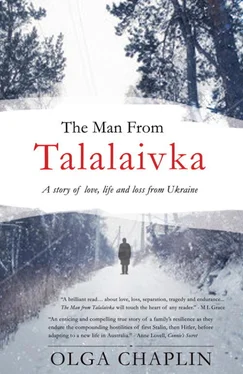It was time to go. But he paused as he immersed himself in the celestial beauty, the spiritual calm of the night. He instinctively felt in his jacket pocket: took out the seating ticket of their naturalisation day, and Vanya’s letter. He felt the thick rough envelope, knew its contents by heart. He had freedom, and safety, now, and a country he could always call his own. Vanya had his country, stood on its soil, but had no freedom to call his own.
His mouth quivered as he tried to form a prayer. He looked up at this church of the nightly stars. His life’s—soul’s—mentor, Taras Shevchenko, must also have gazed at these myriad of stars, during all those years of his exile and incarceration in the gulags, so many decades ago. The philosopher poet had prayed, had appealed to humanity and to the human spirit to awaken, rise up above all else, to improve the human condition, everywhere, and especially in his Ukraine.
From somewhere in the depth of Peter’s past memory, Taras Shevchenko’s Testament reached out to him:
“…Then, in the mighty family
Of all men that are free,
Maybe sometimes, very softly
You will speak of me?”
He gazed at the deep mysterious night sky; could barely pray. That dove of freedom had long left its Naples port; it was not destined to fly this far. His heart ached so. For Vanya. For Ukraine.
He would keep looking to the night sky: search the stars for Taras Shevchenko’s constellation: draw on this great philosopher’s strength, seek the way to his spiritual home. It would be a journey shrouded in the mysteries that the universe could not easily reveal.
He knew it would be a long night.
Ukraine’s history was indelibly intertwined with that of Russia; more so with the ascendancy and zenith of the Romanov dynasty, and its end at the hands of the Bolsheviks. Seemingly invincible, the old Russian empire, stretching west to east from Poland to Vladivostok, and north to south from the Arctic Circle to Odessa in the Black Sea, fell as the last Romanov Tsar was executed at Ekaterinburg in July 1918.
The eruptions prior to, and following, that fateful act, were unprecedented in modern history. A society of over one hundred different nationalities, held together theistically by the Russian Orthodox Church, with Nicholas II as their Little Father, under the ancient concept of benevolent despotism of the ‘divine right of kings’, was torn apart. The cost of Russia’s involvement in the Great War of 1914 to 1918 had become unbearable. Two and a half years of slaughter and military incompetence left the empire in near-bankruptcy, the peasant soldiers leaving the carnage of the battlefields in their thousands to return to the safety of their lands.
Lenin and the Bolsheviks took advantage of the chaos and disintegration of Russian society with their ideals for a ‘classless’ society, based not on nobility privilege, but on equality of all men and women. But the schisms in the Russian empire were too great, as Monarchists pitched themselves and their private armies against Revolutionists. Within weeks of the Bolsheviks’ grasp of power in October 1917 a civil war erupted, to last three horrific years. With, at one point, only an enclave around Moscow as their stronghold, the Bolsheviks implemented measures, temporary in Lenin’s thinking, for dictatorial controls over all of the empire’s peoples.
The ‘one-party’ system, emanating from the Kremlin during the civil war, brought in a range of reforms and modifications that were to forever change the society of Russia and the empire, including the Ukraine. By the civil war’s end, in March 1921, and with Lenin’s introduction of his New Economic Policy (NEP Scheme) the privileged monarchical society based on the nobility was gone, along with its Russian Orthodox Church. In its place was an efficient yet flexible bureaucracy, extended voting for workers, education opportunities, land reforms—and now a new national military regime, forged in the Red Army, based on modern education and military technology.
Lenin now turned his attention to better implementing his reforms, and to encourage small land-holding farmers to improve their yields, in order to allow Russia to grow in agricultural and capital wealth which was so necessary for the Russian empire to become fully industrialised. The Bolsheviks’ natural leader, he saw no reason for naming his successor: his untimely death in January 1924 provided opportunity for Stalin to seize power, not by coup, but by stealth. By the end of 1928, Stalin had either sidelined, expelled from the Politburo and the Bolshevik Party, or exiled almost all of Lenin’s original supporters—keeping only the young Bukharin, who was so like Lenin in appearance and ideology, but was now under his control, as the popular ‘people’s Bolshevik’—all the while strengthening his complete grasp over the Politburo and, ultimately, the whole of the Russian empire.
Stalin’s Five Year Plans, begun in the countryside even before the 1929 official date, targeted the independent small farmers, most of whom were in the Ukraine, the empire’s ‘black-soil’ region, its perennial ‘bread basket’. His collectivisation struck off all of Lenin’s land production policies; worse still, it dismembered the very social group which produced the grain for the empire. With the Ukraine’s grain output constant, yearly, and it being geographically placed ideally for all food grown in a Russian empire, which had seen privation and poor harvests every second year of the previous Tsarist regime, the disruption to the Ukraine’s wheat and other production was catastrophic.
Understandably, the Ukrainian farmers were unwilling to give up their land without a fight. But this is what Stalin wanted. Labelling any farmer unwilling to leave his land a ‘kulak’ (wealthy opportunist farmer under the old regime), his ruthless methods of charges, imprisonment, executions, and sentences to Siberian labour camps, at the same time starving the Ukrainian people of grain for the sowing season, had the desired effect. Over six million Ukrainians died in the period 1929 to 1933. More importantly, for Stalin, he took absolute control over the Ukrainian people who, even under Lenin’s leadership, had been respected and encouraged to increase their farm productivity, which was so vital to the welfare of all of Russia. From a society which saw the Tsar with his ‘munificent benevolence’ bumble along, yet not take away farmers’ livelihoods, Russia, by the early 1930s saw its new ‘Tsar’, Stalin, a totalitarian dictator, ruling with an iron fist, supported by his legions of soviet cadres, akin to unionists, eager to gain his support. Few of these would have realised that they, in turn, would become Stalin’s victims as the Five Year Plans faltered and as Stalin, with brazen power, took on first the soviets, then the bureaucracy, the Bolshevik Party and, ultimately, the Red Army forces, to irrevocably change the nature of Soviet society: a police state, ruled by fear.
His decimation of the armed forces, in the purges from 1934 to 1939, cost Russia and all its people dearly, as Hitler turned on his previous co-signatory of Poland’s fate, and invaded Russia in June 1941: the infamous Operation Barbarossa, in a three-pronged attack. Yet again, the Ukrainian people suffered as Hitler’s armies secured control over most of the Ukraine, its agricultural and other resources supplying his growing military empire in years to come. Hero Stalin used his genius to hide behind young untried soldiers and marshals and hastily created generals, as they fought valiant campaigns to stop Hitler’s armies within forty kilometres of Moscow. With over twenty million Russian, Ukrainian and other nationalities’ lives lost in the struggle against Hitler’s imperialism, it could be said that the Soviet Union people’s victory over Hitler was in spite of, rather than because of Stalin, whatever his image and speeches from the Kremlin portrayed at the time.
Читать дальше












